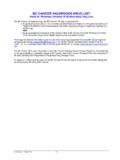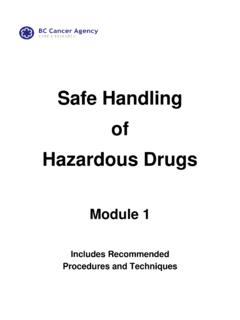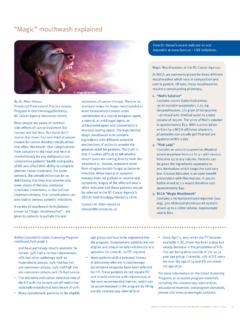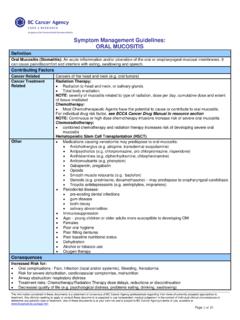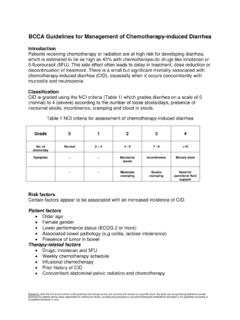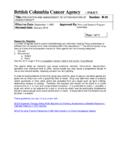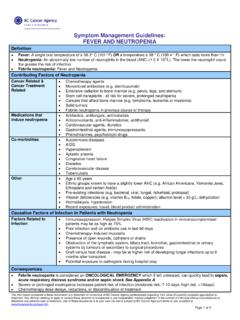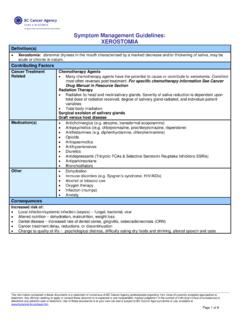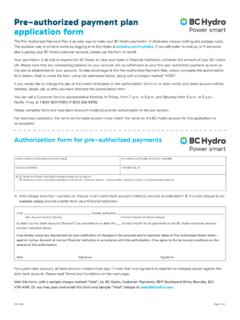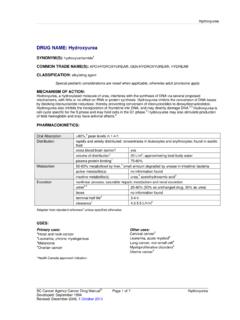Transcription of For the Patient ®, Blood tests - BC Cancer
1 Hydroxyurea For the Patient : Hydroxyurea Other names: HYDREA , APO-HYDROXYUREA , GEN-HYDROXYUREA Hydroxyurea (hye-DROX-ee-yoo-REE-ah) is a drug that is used to treat many types of cancers. It is a capsule that you take by mouth. Tell your doctor if you have ever had an unusual or allergic reaction to hydroxyurea before taking hydroxyurea. Blood tests will be taken regularly during treatment. The dose and timing of your chemotherapy may be changed based on the test results and/or other side effects. It is important to take hydroxyurea exactly as directed by your doctor. Make sure you understand the directions. You may take hydroxyurea with food or on an empty stomach. Wash your hands after handling hydroxyurea capsules or packaging. If you miss a dose of hydroxyurea, take it as soon as you can if it is within 12 hours of the missed dose.
2 If it is over 12 hours since your missed dose, skip the missed dose and go back to your usual dosing times. Your doctor may tell you to drink plenty of liquids , 8 cups (2000 mL or 70 oz) a day, during the first one to two weeks of treatment. This helps prevent kidney problems. The drinking of alcohol (in small amounts) does not appear to affect the safety or usefulness of hydroxyurea. It is not known if hydroxyurea causes sterility in men or menopause in women. If you plan to have children, discuss this with your doctor before being treated with hydroxyurea. Hydroxyurea may damage sperm and may harm the baby if used during pregnancy. It is best to use birth control while being treated with hydroxyurea. Tell your doctor right away if you or your partner becomes pregnant. Do not breast feed during treatment. Store hydroxyurea capsules out of the reach of children, at room temperature, away from heat, light, and moisture.
3 BC Cancer Agency Cancer Drug Manual Page 1 of 3 Hydroxyurea Developed: September 1994 Revised: 6 March 2007 Hydroxyurea BC Cancer Agency Cancer Drug Manual Page 2 of 3 Hydroxyurea Developed: September 1994 Revised: 6 March 2007 Tell doctors or dentists that you are being treated with hydroxyurea before you receive any treatment from them. Hydroxyurea is usually well tolerated and serious side effects are rare. Changes in Blood counts Hydroxyurea may cause temporary changes in your Blood counts. Your doctor will be following these changes carefully by performing Blood tests . Adjustment of your treatment may be needed in certain circumstances. Blood COUNTS MANAGEMENT Normal white Blood cells protect your body by fighting bacteria (germs) that cause infection.
4 When they are low, you are at greater risk of having an infection. This rarely occurs with hydroxyurea. To help prevent infection: Wash your hands often and always after using the bathroom. Avoid crowds and people who are sick. Call your doctor immediately at the first sign of an infection such as fever (over 100 F or 38 C by an oral thermometer), chills, cough, or burning when you pass urine. Normal platelets help your Blood to clot normally after an injury ( , cut). When the platelet count is low you may be more likely to bruise or bleed. This rarely occurs with hydroxyurea. To help prevent bleeding problems: Try not to bruise, cut, or burn yourself. Clean your nose by blowing gently. Do not pick your nose. Avoid constipation. Brush your teeth gently with a soft toothbrush as your gums may bleed more easily. Maintain good oral hygiene.
5 Some medications such as ASA ( , ASPIRIN ) or ibuprofen ( , ADVIL ) may increase your risk of bleeding. Do not stop taking any medication that has been prescribed by your doctor ( , ASA for your heart). For minor pain, try acetaminophen ( , TYLENOL) first, but occasional use of ibuprofen may be acceptable. SIDE EFFECTS MANAGEMENT Hair loss is rare with hydroxyurea. If you lose hair, it will grow back once you stop treatment with hydroxyurea. Colour and texture may change. Use a gentle shampoo and soft brush. Care should be taken with use of hair spray, bleaches, dyes, and perms. Hydroxyurea BC Cancer Agency Cancer Drug Manual Page 3 of 3 Hydroxyurea Developed: September 1994 Revised: 6 March 2007 STOP TAKING HYDROXYUREA AND SEE YOUR DOCTOR OR GET EMERGENCY HELP IMMEDIATELY IF YOU HAVE: Signs of an infection such as fever (over 100 F or 38 C by an oral thermometer), shaking chills; cough, severe sore throat, productive cough (coughing up thick or green sputum); painful urination, cloudy or foul smelling urine; painful, tender, or swollen red skin wounds or sores.
6 Signs of bleeding problems such as black, tarry stools; Blood in urine; pinpoint red spots on skin; severe nose bleed; extensive bruising. Signs of an allergic reaction (rare) soon after a treatment including dizziness, fast heart beat, face swelling, or breathing problems. Seizures or loss of consciousness. SEE YOUR DOCTOR AS SOON AS POSSIBLE (DURING OFFICE HOURS) IF YOU HAVE: Severe skin reaction where you have had radiation. Signs of anemia such as unusual tiredness or weakness. Signs of liver problems such as yellow eyes or skin, white or clay-coloured stools. Signs of kidney problems such as lower back or side pain, swelling of feet or lower legs. Severe stomach pain. Signs of gout such as joint pain. Skin changes such as ulcers, stretch marks and slow wound healing.
7 Significant changes in thinking clearly and logically. Increased sore throat or mouth that makes it difficult to swallow comfortably. CHECK WITH YOUR DOCTOR IF ANY OF THE FOLLOWING CONTINUE OR BOTHER YOU: Nausea, vomiting, constipation, or diarrhea. Loss of appetite. Difficulty swallowing capsules. Drowsiness or dizziness. Headache or pain not controlled with acetaminophen. Easy bruising or minor bleeding. Redness, swelling, pain, or sores on your lips, tongue, mouth, or throat. Swelling of hands, feet, or lower legs. Skin rash or itching. Skin colour or nail changes. REPORT ADDITIONAL PROBLEMS TO YOUR DOCTOR

